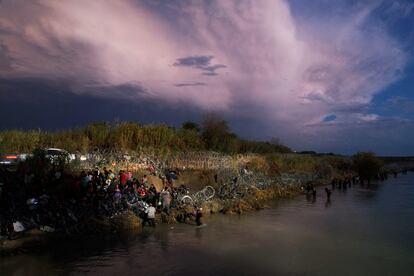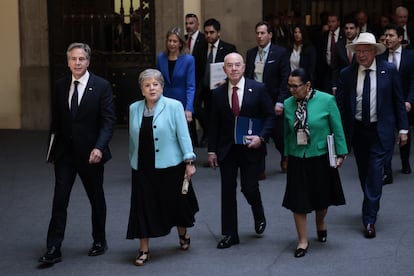New US border wall forces White House to provide explanations in Mexico: ‘We had no choice’
The announcement of new construction on the border fence overshadowed the visit of Antony Blinken and Alejandro Mayorkas, with migration and drug-trafficking the main topics

Declarations of goodwill between the governments of Mexico and the United States collided with the announcement of 20 miles of new border wall between the two countries. During their visit to Mexico City, the delegation of high-ranking officials from Joe Biden’s government was forced to provide explanations to their Mexican counterparts, who acknowledged their “concern” and the poor timing of the decision to extend a section of the fence in Starr County, an area of 65,000 inhabitants where Texas converges with the Mexican state of Tamaulipas. “We believe in bridges, not in walls,” said Mexico’s Secretary of Foreign Affairs, Alicia Bárcena, in a joint press conference with U.S. Secretary of State Antony Blinken. “We had no choice,” Alejandro Mayorkas, the Secretary of Homeland Security, said Thursday at the High-Level Dialogue on Security, insisting that the resources for construction had already been approved during the Donald Trump administration and that the White House was legally obliged to allocate them to that task.
“The Mexican Government is, of course, reluctant and opposed to any types of walls,” said Bárcena, in stating her country’s position on the surprise announcement by the U.S. Department of Homeland Security. Mayorkas published a message on his X account half an hour before the press conference to close the working visit began, in which he insisted that the Biden Administration is not revisiting Trump’s policy on fences to secure its borders. “From day one, this administration has made clear that a border wall is not the answer.”
“I want to be absolutely clear,” Mayorkas reiterated, with a hint of discomfort. “There is no new Administration policy with respect to border walls.” The Secretary of Homeland Security added that the decision was made last June and that for legal reasons the official decree had to published. The controversy in the United States is that the Biden administration waived 26 federal laws in South Texas that stood in the way of the construction of the fence, which will be erected in one of the hot-spots in the exodus of undocumented immigrants from Latin America.
The discomfort grew when the Mexican media asked Bárcena to clarify the position of Andrés Manuel López Obrador’s government, who praised Biden in January for being “the first U.S. president who has not built one meter of wall.” “Unfortunately, that announcement coincides with their visit,” Bárcena said, adding that she felt Mayorkas had “properly clarified” the situation. Biden had already stated his position at the White House a couple of hours earlier. The president, who promised during the electoral campaign in 2020 that he would not extend the border fence, said he had been unable to persuade Congress to change the destination of the resources. “There’s nothing under the law other than they have to use the money for what it was appropriated for. I can’t stop that,” he said. When asked by reporters if the wall was effective in stopping immigration. Biden answered simply, “no.”
The announcement also caught the Democratic Party by surprise and caused a backlash in the ranks. “The President needs to take responsibility for this decision and reverse course,” said Alexandria Ocasio-Cortez in a statement. “The Biden administration was not required to expand construction of the border wall — and they certainly were not required to waive several environmental laws to expedite the building.”

“Mexico does not produce fentanyl”
The other issue that dominated the visit of Blinken, Mayorkas and Attorney General Merrick Garland was combating the fentanyl crisis. “Mexico does not produce fentanyl,” stated Secretary of Security Rosa Icela Rodríguez at the head of the Mexican delegation, explaining that the country is a transit route. However, moments later, Garland spoke of the distribution chain of synthetic drugs and how the Sinaloa Cartel and the Jalisco New Generation Cartel are “producing and trafficking fentanyl” from Mexico to the United States.
The apparent contradiction was noted by the Mexican journalists, who asked Rodríguez and Bárcena for clarification. “There is no contradiction in the U.S. position and the Mexican position. In Mexico, we do not produce — I insist — chemical precursors. Those chemical precursors come from Asia – generally from different countries” the security secretary said, adding that synthetic drug labs that have been discovered by law enforcement mostly produce methamphetamines.
Mexico’s refusal to acknowledge that fentanyl is produced in its territory has been one of the most controversial issues in Washington and a recurring point of criticism against the Biden administration by Republicans. Bárcena insisted “there are no legal laboratories for the production of fentanyl in Mexico” but conceded that there are “illegal laboratories” that do. U.S. officials did not offer further comment on the Mexican secretaries’ interventions. Later, Bárcena insisted on the point. “There is no denial. What is true is that what mainly exists in Mexico is methamphetamine, so we’re facing a different problem,” she said of fentanyl use in Mexico, which “hasn’t arrived in the proportions it has arrived in the United States.”
The foreign minister also stated her desire to move beyond the narratives that seek to pit the two countries against each other and urged both governments to maintain cooperation in the fight against organized crime, human trafficking, arms trafficking, and the management of the migration crisis. The extradition of Ovidio Guzmán, one of the sons of jailed Sinaloa Cartel kingpin Joaquín “El Chapo” Guzmán, son, was also mentioned at the conference, as well as Washington’s announcement that it would resume mass deportations of Venezuelans to relieve pressure on the border. “His extradition is a powerful example of what we can achieve when we work together,” Garland said of Guzmán.
Blinken highlighted an “unprecedented partnership” between the two countries, although he also said that the current challenges they face have no point of comparison in the past. Mexico and the U.S. closed this year’s High-Level Dialogue on Security with renewed promises and new agreements, but not without some differences, pressures, and sticking points, against the backdrop of presidential elections on both sides of the border next year.
Sign up for our weekly newsletter to get more English-language news coverage from EL PAÍS USA Edition
Tu suscripción se está usando en otro dispositivo
¿Quieres añadir otro usuario a tu suscripción?
Si continúas leyendo en este dispositivo, no se podrá leer en el otro.
FlechaTu suscripción se está usando en otro dispositivo y solo puedes acceder a EL PAÍS desde un dispositivo a la vez.
Si quieres compartir tu cuenta, cambia tu suscripción a la modalidad Premium, así podrás añadir otro usuario. Cada uno accederá con su propia cuenta de email, lo que os permitirá personalizar vuestra experiencia en EL PAÍS.
¿Tienes una suscripción de empresa? Accede aquí para contratar más cuentas.
En el caso de no saber quién está usando tu cuenta, te recomendamos cambiar tu contraseña aquí.
Si decides continuar compartiendo tu cuenta, este mensaje se mostrará en tu dispositivo y en el de la otra persona que está usando tu cuenta de forma indefinida, afectando a tu experiencia de lectura. Puedes consultar aquí los términos y condiciones de la suscripción digital.









































